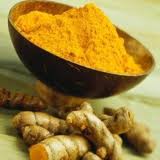 Osteoarthritis is characterized by progressive, degenerative changes in cartilage structure. The proteoglycans break down, losing their ability to form tight clusters. The water content of cartilage increases. Chondroitin sulfate shortens in length. Cartilage loses the ability to repair itself and develops clefts and crevices that eventually extend down to the underlying bone. The end result is weak, stiff, and deformed joints.
Osteoarthritis is characterized by progressive, degenerative changes in cartilage structure. The proteoglycans break down, losing their ability to form tight clusters. The water content of cartilage increases. Chondroitin sulfate shortens in length. Cartilage loses the ability to repair itself and develops clefts and crevices that eventually extend down to the underlying bone. The end result is weak, stiff, and deformed joints.
In Ayurvedic medicine (traditional Indian medicine), turmeric rhizome has been used for centuries internally as a tonic for the stomach and liver and as a blood purifier. It has also been used externally in the treatment and prevention of skin diseases and in arthritic complaints. Curcumin is a component of turmeric. The laboratory and clinical research indicates that turmeric and its phenolics have unique antioxidant and anti-inflammatory properties. The anti-inflammatory strength of turmeric is comparable to steroidal drugs such as indomethacin. Turmeric has been reported to be anti-rheumatic, anti-inflammatory and antioxidant.
A recent study evaluated the efficacy of curcumin in patients with osteoarthritis. The study included 50 patients with osteoarthritis of the knee who were treated by their doctors using the best traditional treatments. The patients were them divided into two groups in which one group was also given a supplement of 200 mg of curcumin daily. At the start of the study and then again after three months, the patients completed a treadmill test. The results were recorded as the total distance that could be walked without pain. The patients also completed questionnaires to record their symptoms of osteoarthritis.
The results revealed that after supplementing with 200 mg of curcumin for three months, the treadmill test scores were prolonged from 76 meters to 332 meters. It was also found that those taking curcumin reported a 58 percent decrease in osteoarthritis symptom scores. The participants in the control group only saw very modest improvements in these parameters. These results suggest that curcumin is clinically effective for the treatment of osteoarthritis and that further studies are warranted.
Source: Belcaro G, Cesarone MR, Dugall M, et al. Product-evaluation registry of Meriva®, a curcumin-phosphatidylcholine complex, for the complementary management of osteoarthritis. Panminerva Medica. 2010.52(2):55-62.